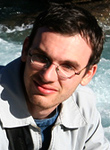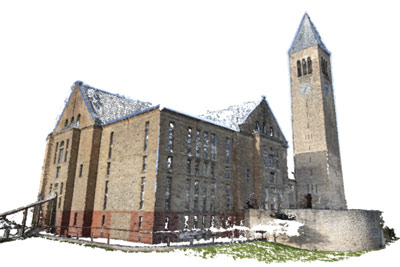Microsoft fellowship could help create a worldwide camera
By Bill Steele

Noah Snavely, assistant professor of computer science, has been named one of eight Microsoft Research Faculty fellows for 2011.
The awards, previously known as Microsoft New Faculty Fellowships, are intended to support young scientists "who are advancing computing research in novel directions with the potential for high impact on the state of the art, and who demonstrate the likelihood of becoming thought leaders in the field."
The fellowship includes a cash award of $200,000 given over two years and access to Microsoft resources such as software, invitations to conferences and engagements with Microsoft Research.
Snavely has applied the techniques of computer vision to still photographs to match the details of many photos and stitch them together into 3-D renderings. To demonstrate, he has created 3-D images of popular tourist destinations from the hundreds of images posted to the Flickr photo-sharing website and launched an online game, PhotoCity, in which Cornell and the University of Washington (where Snavely began his research as a graduate student) are competing to build 3-D campus maps. Microsoft has developed the technology into an application called Photosynth, which it ties in with Bing Maps.

There are uses for the technology, Snavely said, in online tourism and education, preserving art that might someday be lost and showing how places change over time. A future direction, he added, will be to organize all the images that exist online into a calibrated set, "to combine all these cameras all over the world into a big distributed camera you can use to image anything you want."
He plans to use the Microsoft funding to expand his research group. "I think this is a great opportunity to build a group that will be excited about these new ideas," he said.
Snavely joined the Cornell faculty in 2009. He earned his B.S. in computer science and mathematics at the University of Arizona in 2003, and his Ph.D. in computer science at the University of Washington in 2008.
Media Contact
Get Cornell news delivered right to your inbox.
Subscribe